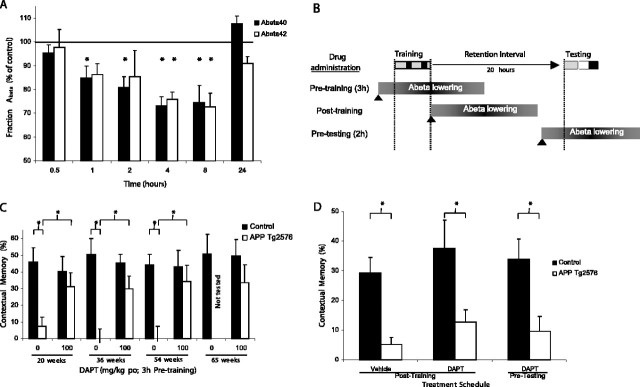Figure 3.
A, Oral DAPT (100 mg/kg) in 20-week-old Tg2576 mice produced a significant reduction in Aβ40 and Aβ42 at 1–8 and 4–8 h, respectively (*p < 0.05 vs vehicle treatment). B, Schematic representation of the effect of drug treatment (triangle) on brain levels of β-amyloid levels relative to CFC training and testing. Drug treatment before training results in β-amyloid reductions during and after the training session but not during the testing session. Drug treatment immediately after training results in β-amyloid reduction during the retention interval. Treatment before testing decreased β-amyloid at the time of testing, with the usual elevated levels during training and the retention interval.C, Acute treatment with DAPT(100mg/kg, orally) 3 h before training improved conditioning in Tg2576 mice from 20 to 65 weeks of age. DAPT-treated Tg2576 mice at 20, 36, and 54 weeks of ages had contextual memory scores significantly greater than vehicle-treated Tg2576 and not significantly different from DAPT-treated controls. No effect of DAPT was observed on the performance of controls at any age. Vehicle-treated Tg2576 mice demonstrated a significant impairment at all ages tested. Brackets denote group mean comparisons (*p < 0.05). D, Twenty-week-old Tg2576 mice treated with vehicle immediately after training displayed significant impairments in contextual memory (*p < 0.05 vs controls). DAPT (100 mg/kg, orally) administered either after training (lowering β-amyloid during the retention interval) or 2 h before testing (loweringβ-amyloid during testing) failed to attenuate the contextual memory deficit in the Tg2576 mice (*p < 0.05 vs controls). Error bars represent SEM.

